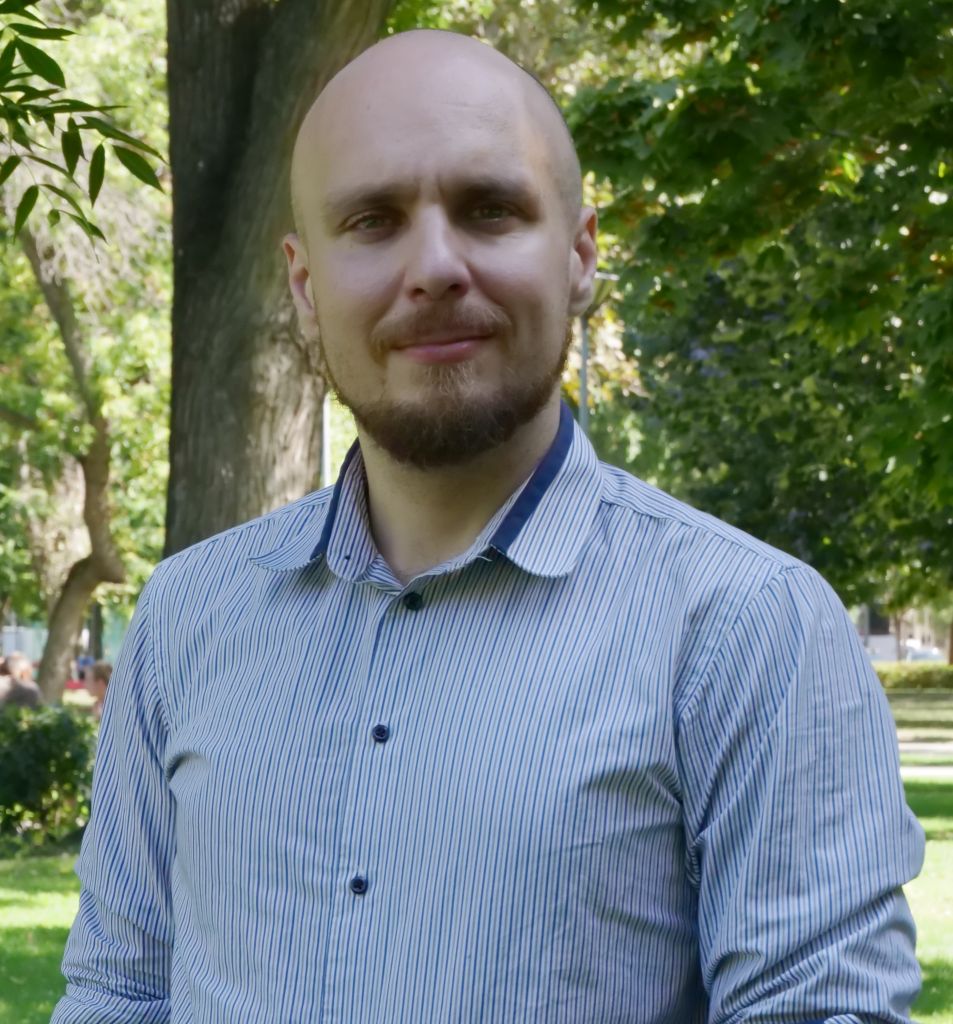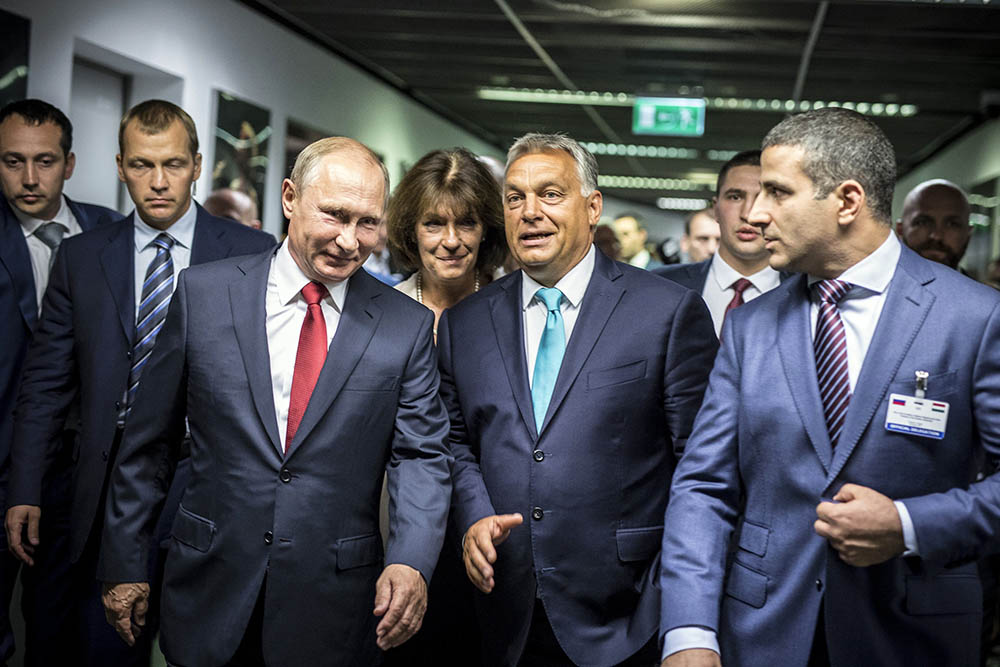The https://english.atlatszo.hu use cookies to track and profile customers such as action tags and pixel tracking on our website to assist our marketing. On our website we use technical, analytical, marketing and preference cookies. These are necessary for our site to work properly and to give us inforamation about how our site is used. See Cookies Policy
“Respect and gratitude to Putin!” – blatant Kremlin propaganda on pro-government media channels in Hungary
While the Hungarian government officially supports Ukraine in line with the common EU and NATO position, a large part of the governing Fidesz party’s media machine has openly spread pro-Moscow propaganda, following the Russian occupation of Donetsk and Luhansk and the attack against Ukraine proper. Several media channels associated with Viktor Orbán’s government publicized fake news portraying Ukraine as the aggressor, and there have even been calls for Hungary to take part in a partition of Ukraine.
It was really Ukraine and the West that attacked Russia; Ukrainian soldiers have massacred civilians in eastern Ukraine; there is no such thing the Ukrainian nation – such and similar messages have appeared not only in Russian state propaganda, but also on channels supporting Viktor Orbán’s government, some of them funded by the Hungarian state. While politicians of the ruling Fidesz party have been very diplomatic when commenting the Russia-Ukraine conflict, several tools of the Fidesz media machine are spreading a contradicting message.

Russian narratives
In his speech announcing the recognition of the Easter Ukrainian breakaway republics on February 21, Russian President Vladimir Putin made several unsubstantiated claims to serve as a pretext to an attack against the sovereign nation of Ukraine. Among other things, he claimed that Kyiv was threatening Russians living in Ukraine, that it had launched attacks against the breakaway regions, and that the country strengthening ties with the West is a direct threat to Russian security. He also stated that the Ukrainian nation has no historic precedent, and the region had historically always been part of Russia.
Prior to this, the Kremlin’s propaganda machine was also set in motion to create a pretext for the Russian operations, which they try to present as a pre-emptive strike or peacekeeping operation. The Russian media have also shown staged footage of what they claim are attacks by the Ukrainian army on Donetsk and Luhansk.
One Russian state TV station for example showed footage supposedly showing Ukrainian commandos carrying out a sabotage operation in rebel-held Donetsk. The heavily publicized video was later proven fake by Elliot Higgins, founder of the investigative portal Bellingcat, who pointed out that the recording contains sound effects from a 2010 YouTube video.
Anatomy of a Russian Seperatist False Flag – On February 18th the Telegram channel of the press service of the People’s Militia of the Donetsk People’s Republic published the following video, claiming to show a sabotage operation targeting chlorine tankshttps://t.co/Syk8NG2zKx pic.twitter.com/R4mfggxbPg
— Eliot Higgins (@EliotHiggins) February 20, 2022
Russian media and politicians also claimed that Ukraine committed genocide against Russians and that they have been preparing for a massive attack against the breakaway republics (none of these claims were confirmed by international monitoring organizations such as the UN or the OSCE).
Orbán also supported sanctions
The main claims of Russian war propaganda are worth reviewing because they have also appeared on media sites linked to governing party Fidesz and the Hungarian government, even though the government sides with Ukraine in the conflict. Viktor Orbán said at the beginning of the Russian operations that he “shares a common position” with other NATO and EU member states, and later signed the shared EU sanctions. Although, the Guardian’s sources claimed that Orbán first attempted to block the sanctions; this was refuted by the Hungarian minister of international communications.
At the same time, parts of the pro-Fidesz media (which is reportedly strictly controlled by actors close to PM Orbán), including publicly funded channels, were broadcasting open or subtle Kremlin propaganda. It was most prominent on social networking sites close to Fidesz, but Putin’s narratives were also present on TV and news websites to a certain extent. In addition to the above-mentioned distortions,
a homebrewed fantasy also emerged: that Putin will return Transcarpathia to Hungary.
Transcarpathia is a region that belonged to the Kingdom of Hungary in the past and still has a large ethnic Hungarian minority.
“Areas between Russia and Ukraine”
The state news channel M1 covered Putin’s February 21 announcement by presenting the position of all parties but emphasized “people of the separatist-controlled areas were celebrating the Russian decision”, because previously “they belonged neither to Russia nor to Ukraine”, which left the destitute – in truth, the whole of Donetsk and Luhansk are officially recognized by Hungary as parts of Ukraine. In the state TV however, they referred to the regions as “areas between Russia and Ukraine”.
Even stronger pro-Russian statements were made in Pesti TV, a private TV station that receives funding from the Hungarian government.
Here, a guest who presented himself as an expert on Ukraine (he is actually a photographer and military engineer), said that there is no such thing as Ukrainian people and culture, and that Ukrainian is just a dialect of Russian. He also said that Ukrainian soldiers had invaded eastern Ukraine. One of the presenters replied that “allegedly” they even entered Russian territory near Rostov. The “expert” guest also referenced the idea that Ukraine could be divided between Russia and “certain NATO member states”.
Pesti Srácok, a news website affiliated with the TV, also published a false report of Ukranians attacking a power station of the rebel side.
One publicist of the same site also openly called for the dissolution of the Ukrainian state,
calling it “an artificial state created by the West at their desks with satanic evil”, and called for its lands to be “returned to its original owners.”
Cheering for the war
The biggest contrast with the official positions could be seen in social media, on Facebook pages that belon to a network referred to the “Fidesz Metaverse”, a collection of social media pages regularly cross-sharing each other and spending massive amounts on paid advertising.
A central node of this network is a Facebook page called “Numbers – the antidote to left-wing fake news”, which commented on Putin’s decision to invade Ukraine thusly: “Russia recognizes the independence of the Donetsk People’s Republic and the Luhansk People’s Republic! Respect and gratitude! (…) We hope they will hold a referendum like Crimea, they will ask to join Russia, and Russia will accept them.”
The page also claimed that the Ukrainian army has been “killing people in the eastern provinces with tanks for 8 years” and that 14,000 Russian civilians have already been killed. Elsewhere, they argued against sanctions against Russia (and later wrote that whatever the Hungarian government decides on the matter, they will support it). The page even supports the full invasion of Ukraine, calling it “Russia’s decisive steps to bring peace”.
Another page named “Patriotic Europe Movement” published memes reinforces the Kremlin narrative that NATO (i.e. Hungary’s military allies) is the real aggressors against Russia. In another post, they wrote that “Ukraine is being held captive by the banking elite” and that the current crisis is the result of “US provocation”.
This page, which has 210,000 followers, is noteworthy
not just because it spread Russian propaganda in the past too, but also because it did so using Hungarian government funds.
In 2021, Átlátszó published a list of contracts by the Prime Minister’s Office, which includes a deal with an NGO named Hungarian Civic Cooperation Association (MPEE). The document shows that the government gave HUF 6 million to develop the Patriot Europe Movement Facebook page. MPEE is also known for organizing Viktor Orbán’s annual speech, and in 2019, it was directed by Mariann Vízkelety, former Minister of State for Justice Relations at the Ministry of Justice.
Written and translated by Zalán Zubor, the Hungarian version of this story is avialable here. Cover image: MTI Fotó: Miniszterelnöki Sajtóiroda / Szecsődi Balázs
Hungary. What do you know about Hungary? from atlatszo.hu on Vimeo.

